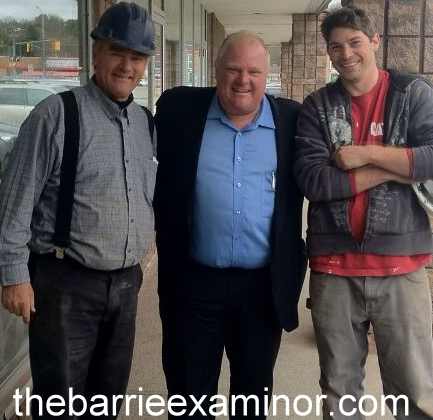mayor for all seasons
REFLECTIONS ON ROB FORD

by
JOSEPH HEATH
________________________________________________________
Joseph
Heath is Professor in the Department of Philosophy and the School
of Public Policy and Governance at the University of Toronto and
author of several books including Morality, Competition and
the Firm (Oxford, 2014) and Enlightenment 2.0, which
won the Shaughnessy Cohen prize for Political Writing in 2015.
Rob
Ford’s death in March, 2016 has prompted some great thinking
and writing. I don’t have much to add, except for one little
observation, which I don’t think has been given enough play.
It is about social class.
Rob
Ford was often described as a champion of the little guy, of being
the “people’s mayor.” He was also inordinately
popular among what we academics refer to, euphemistically, as
low-SES individuals (SES standing for socio-economic status).
And yet it was often pointed out that Ford himself was rich, he
was born to a rich family, and had never really had to work for
a living – outside the family business – before he
entered politics. He was, in other words, a comfortable member
of the economic elite. (Furthermore, many of Ford’s policies
did not really benefit his supporters. Property taxes, in particular,
are about the closest thing we have to a pure wealth tax in our
society, so his insistence of keeping them as low as possible
generated significant benefits for the wealthy and little more
than spare change for the downtrodden).
And
yet somehow the charge that Ford was just a rich guy, pushing
through an agenda that benefited the rich, never seemed to stick.
The reason it was not more persuasive is that, despite having
been born to a higher social class, he was never really a member
of it –  indeed,
he was quite visibly uncomfortable with it. Partly this is because
the Ford family were nouveau-riche, and so they never adopted
upper-class taste (remaining, from a class perspective, vulgar
– e.g. driving Escalades). But second, and more important,
is that Ford was one of those people who, being uncomfortable
with the class into which he was born, clearly aspired to downward
social mobility. People like this are not that common, but I’ve
met a few – where every major life decision they make seems
to be geared toward moving into a lower social class than that
of their parents.
indeed,
he was quite visibly uncomfortable with it. Partly this is because
the Ford family were nouveau-riche, and so they never adopted
upper-class taste (remaining, from a class perspective, vulgar
– e.g. driving Escalades). But second, and more important,
is that Ford was one of those people who, being uncomfortable
with the class into which he was born, clearly aspired to downward
social mobility. People like this are not that common, but I’ve
met a few – where every major life decision they make seems
to be geared toward moving into a lower social class than that
of their parents.
Remember
the scene in Breaking Bad, when you first see Jesse Pinkman’s
family home, and you realize suddenly what sort of a class background
he comes from:
Rob
Ford was like that, too. There was no better illustration of it
than in the infamous Steak Queen video. Lots of people saw this
video and imagined that it would dent Ford’s popularity.
(One doesn’t often hear the mayor of a major city referring
to the chief of police as a “cocksucker,” much less
“bumbaclot.”) Newspapers described the episode as
“damaging” and “embarrassing” to the members
of Ford Nation. The effect, however, was the exact reverse, because
commentators missed the larger frame. Here was Rob Ford, totally
inebriated, hanging out at Steak Queen with his friends in the
middle of the night. Hands up how many people had ever heard of
Steak Queen, or eaten there, prior to this video? More generally:
who the hell eats at Steak Queen? Here’s what it looks like.
There
are hundreds of these places around Toronto. They are, perhaps
needless to say, frequented by low-SES individuals. (Not that
there’s anything wrong with that). Steak Queen is distinguished
by being open 24-hours, and so is popular with the after-bar crowds.
I
think this is one of the reasons that Ford is often described
by his supporters as “honest” and “authentic”
– despite the fact that he was an inveterate liar. Most
politicians belong to a social class that is above that of the
median voter. They have university degrees (often in law), they’ve
had capital-C careers, and perhaps most importantly, they have
bourgeois taste. As a result, most of them have to be very careful
to avoid the impression of talking down to their constituents.
So they often find themselves scaling back their vocabularies,
pretending to have an interest in sports, acquiring a taste for
Tim Horton’s coffee, etc.
Some
are better than others at this. I am reminded of John Kerry, stopping
for a cheese-steak sandwich while campaigning in Philadelphia,
and trying to order it with Swiss cheese. Catastrophic error.
There is only one correct type of cheese to eat on the cheese-steak
sandwich, and that is Cheese Whiz. His opponent, George W. Bush,
ordered it “wiz wit” – the correct local idiom.
But this just meant that Bush was better briefed by his campaign
staff. One does not get the sense that Bush, Yale graduate and
scion of privilege, spent much time hanging around cheese-steak
joints.
And
yet there was Rob Ford, hanging out at Steak Queen. What a lot
of low-SES people saw, in this video, was a guy who was not just
pretending to like the sort of things that you like, but one who
‘actually’ likes them. Far from looking down on you,
he actually wants to be like you. Here was a man with genuine
affection for the lower classes. Lots of fancy downtown Marxists
profess to care about the poor, but would recoil with horror at
the thought of eating at Steak Queen. (Observe what happened when,
in the wake of the video, the Toronto Star sent its restaurant
critic to write a review).
Class
solidarity, as well as class antagonism, usually finds its most
powerful expression in aesthetic judgement. This is one of the
reasons that all the criticisms people made of Ford as mayor had
so little impact on his supporters. They read it in class terms,
and interpreted it as just another version of ‘looking down’
on them.